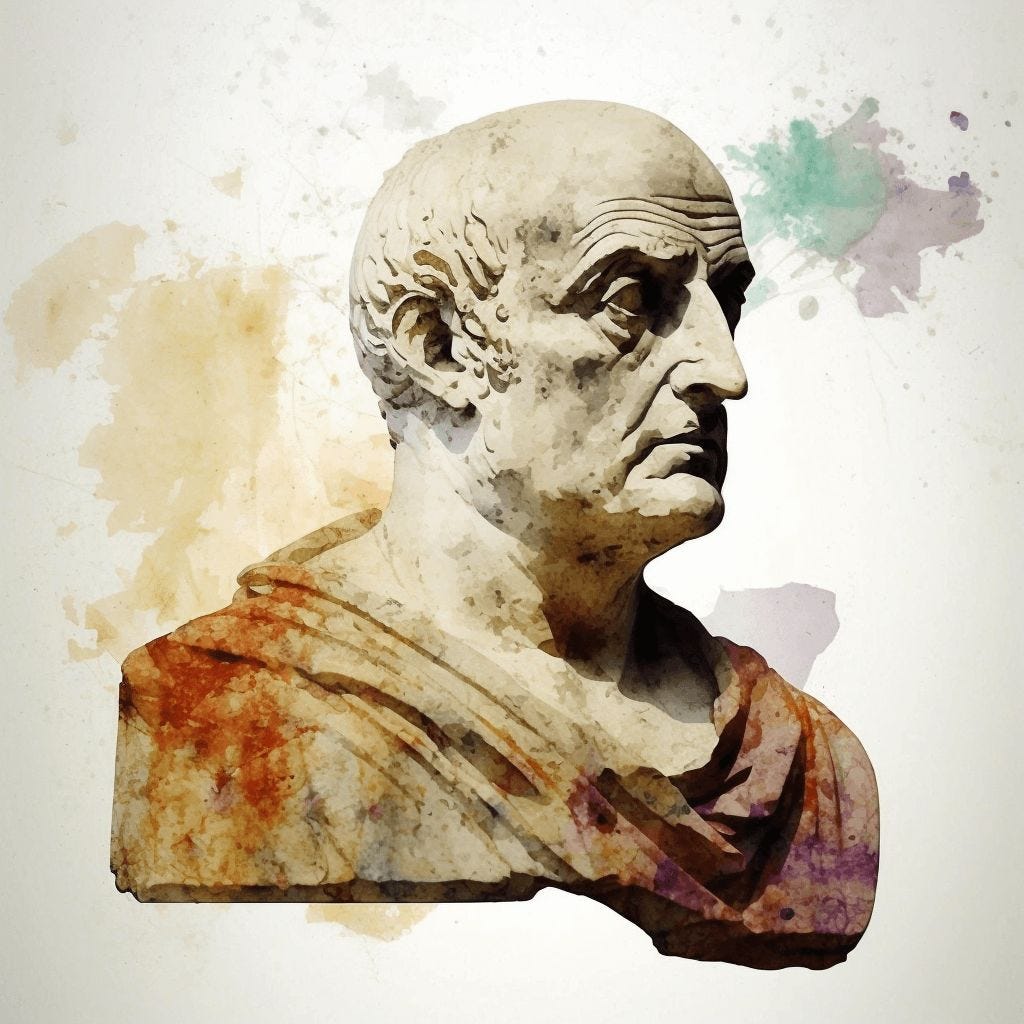A Stoic On Time
While we postpone, life speeds by
Welcome to The Stoa Letter, the newsletter on Stoic theory and practice.
Every week we share two emails to help you build resilience and virtue with ancient philosophy. Each email includes one meditation on Stoic theory, one action to do in order to become more Stoic, and links to the best resources we’ve found.
🏛️ Theory
Seneca wrote his Moral Letters later in life. The Stoic philosopher and statesman retired from politics, but, as he suspected, politics had not tired of him.
Indeed, the emperor Nero, Seneca’s former pupil, would order Seneca’s suicide shortly.
Seneca must have known that he did not have much life left. But perhaps that’s something he always knew and that’s why he worked feverishly to improve himself, his craft, and the Roman empire throughout his life.
Indeed, he wrote that we are all dying daily. What matters is that we use what we have left well.
While we are postponing, life speeds by.
Seneca, Moral Letters 1
In Moral Letters, Seneca urges his reader to take account of their time. Identifying how you spend your time is the first step toward balancing your time budget. Determine when you spend time well, when you waste it, and the reasons behind your actions.
Then consider how you will change.
The most obvious transformation is to remove nonsense from our lives. Do not let others waste your time. Do not lose yourself in worthless pursuits or pointless arguments. Life is too short for that.
Substitute empty time with worthwhile activities. Cultivate your craft, enrich your relationships, and appreciate beauty in moments that would otherwise be squandered.
Seek to improve the quality of each moment. If you must do something, do it well. Take joy in embracing reality. Practice staying in the present. None of us know how much life we or our loved ones have left. As the Roman Horace says:
Life ebbs as I speak –
so seize each day, and grant the next no credit.
Horace, Odes 1.11
Use the breath as a reminder of the temporary nature of things.
In summary, remove nonsense from your life, substitute it with excellent activities, and experience every moment fully.
Towards the end of life, Seneca must have wondered whether he and his companions used their time well. After all, as he advises his friend Lucilius to:
Keep what is really yours; and you cannot begin too early.
Seneca, Moral Letters 1
What is the central thing that is ours? Time.
🎯 Action
Bring to mind some nonsense activities that you can remove from your life. Remove them.
🔗 Resources
🏛️ We just extended our Seneca routines in the Stoa app. Check it out for more meditations and routines on Seneca’s life and letters.

As always, if you cannot afford the app, reach out to us and we’ll set you up with a free account.
📓 In an essay that must have been heavily influenced by Seneca, the investor Paul Graham writes:
Is life actually short, or are we really complaining about its finiteness? Would we be just as likely to feel life was short if we lived 10 times as long?
Since there didn't seem any way to answer this question, I stopped wondering about it. Then I had kids. That gave me a way to answer the question, and the answer is that life actually is short.
Paul Graham
📜 Read the full letter On Saving Time from Seneca here. Most free versions of the ancient Stoic works available online are not ideal, however, Wikisources’s Seneca translation is quite good.
What did you think about today's letter?
🏆️ Share The Stoa Letter
If you find what we’re doing useful, please share it. Just have people sign up with your link below.
Share The Stoa Letter
{{rp_personalized_text}}
Or copy and paste this link to others: {{rp_refer_url_no_params}}
Get hundreds of Stoic meditations and lessons with the Stoa app (free download)

